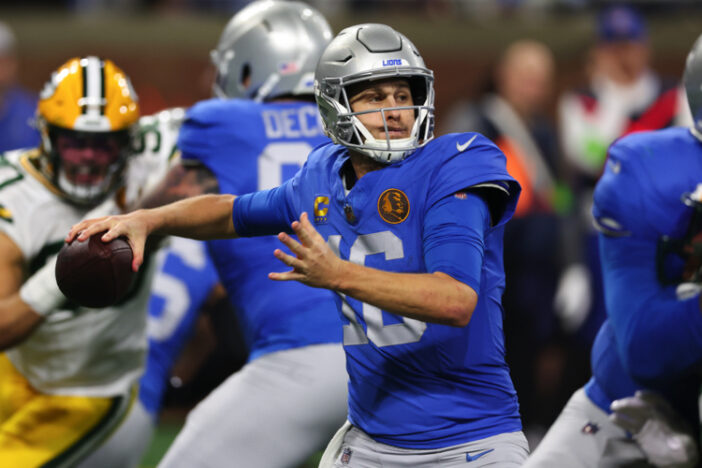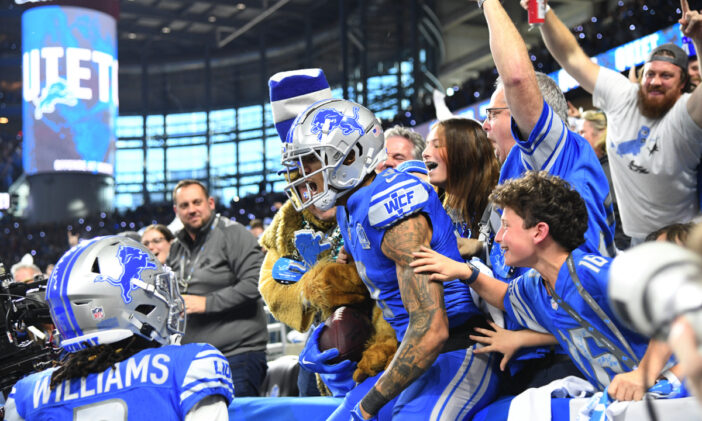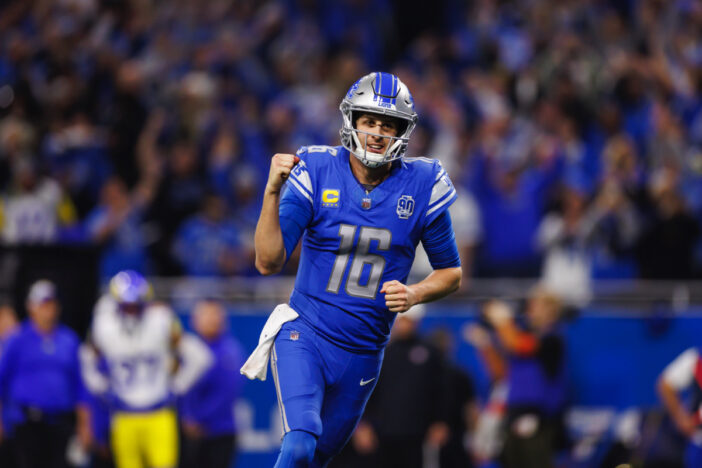When in doubt, give something out.
Most of Michigan’s mobile sportsbooks used that blueprint over the past two months to stem the tide of year-over-year declines in sports wagering handle heading into the final two months of 2023.
Though the Wolverine State ranks 13th nationally with $3.61 billion worth of accepted wagers this year, that total is down 5.4% compared to the first 10 months of 2022. The decline for digital handle is less steep — the $3.48 billion in wagers is 3.2% off last year’s comparable total — but that was only after the $990.7 million in combined wagers for September and October was up 17.2% year-over-year.
Michigan’s mobile sportsbooks totaled $958.7 million handle in the final two months of 2022, a challenging figure to match or better even with the 14 online operators surpassing one-half billion dollars for the first time in October. There is year-to-year fluctuation with practically every operator, and there is also one less than last year after FOX Bet closed up shop during the summer.
On the plus side, there are unprecedented sports tailwinds. The Lions are playoff contenders and head into their Week 13 matchup against the Saints with a 2 1/2-game lead atop the NFC North. The Michigan Wolverines are in the Big Ten title game and on the cusp of the College Football Playoff. The Red Wings are trending positively through their first 20 games in a competitive Atlantic Division and just signed three-time Stanley Cup winner Patrick Kane on Tuesday.
In the end, though, matching or surpassing last year’s $4.55 billion in online handle may come down to the deeper pockets of the bigger mobile books to keep bettors engaged and some smaller ones being more aggressive to attract new bettors who have climbed onto those sports teams’ bandwagons.
Promotional play a loss leader in the big picture
The Michigan Gaming Control Board does not specify the amount of promotional spend by operators in its monthly reports, but the important part is that mobile sportsbooks can deduct all their free play against gross revenue earned. That is notably different than with online casinos, as those operators are currently limited to a 10% deduction against gross revenue.
Thus, sports betting in Michigan serves as a loss leader of sorts when compared to iGaming — something tax revenue numbers bear out. The 8.2% combined rate when counting state and city taxes for sports wagering has generated $18.4 million in receipts this year from $194.1 million in adjusted gross revenue. Meanwhile, mobile casino AGR in October alone totaled $144.2 million, which resulted in an inflow of $30.1 million into state tax coffers based on a progressive rate that starts at 20%.
The spread between sportsbook gross revenue and adjusted gross revenue usually exceeds that of iGaming despite the latter sometimes being as much as three times higher. In September and October, there was $46.8 million in promotional play deducted by sportsbook operators against $91.7 million in gross revenue; internet casino operators claimed nearly $32.7 million in deductions against $326.7 million in winnings in those two months.
Despite the year-over-year bounce in sports wagering handle spanning September and October, gross and AGR mobile revenue went in the opposite direction. The $89 million in gross revenue was down 8% compared to the same time period in 2022, while adjusted revenue dropped 28.1% to $42.2 million. Adjusted revenue accounted for only 47.4% of gross revenue this year compared to 60.7% in 2022, as the promotional spend of $46.8 million was up 23.1% year-over-year.
Top operators among the biggest spenders
| Sportsbook | Sep/Oct 2022 promo spend | Sep/Oct 2022 AGR | Sep/Oct 2022 AGR % of gross revenue | Sep/Oct 2023 promo spend | Sep/Oct 2023 AGR | Sep/Oct 2023 AGR% of gross revenue |
| FanDuel | $12,780,797 | $27,074,200 | 67.93% | $15,560,632 | $21,813,961 | 58.37% |
| DraftKings | $8,871,138 | $11,536,768 | 56.53% | $17,154,284 | $10,831,959 | 38.70% |
| BetMGM | $9,944,501 | $9,811,492 | 49.66% | $7,821,496 | $6,873,737 | 46.78% |
| PENN Entertainment | $890,197 | $5,878,759 | 86.85% | $835,572 | $1,387,238 | 62.41% |
| Caesars | $1,870,072 | $3,445,460 | 64.82% | $1,356,821 | $1,769,898 | 56.61% |
| BetRivers | $550,547 | $343,987 | 38.45% | $1,898,297 | -$748,633 | -65.12% |
Practically every conversation when it comes to mobile sportsbook revenue begins with FanDuel and DraftKings, and it is no different when reviewing promotional spend and performance in the Wolverine State. FanDuel’s ability to consistently generate double-digit holds means it is capable of both maintaining a higher percentage of AGR to gross revenue and also offering more promotional play if needed.
FanDuel has posted double-digit win rates for 16 consecutive months, though this year it failed to crack 12% in either September or October. Thus, its $37.4 million in gross revenue was 6.2% lower compared to the $39.9 million claimed in 2022.
Its promotional spend also increased 21.8% this year to close to $15.6 million. While FanDuel still had a healthy $21.8 million in taxable revenue combined for both months, it was 19.4% lower than last year and represented only 58.4% of its gross revenue. The $27.1 million in AGR last year accounted for 69.3% of gross revenue.
DraftKings, in what has been an aggressive spend this year to keep pace with FanDuel for market share, had a more pronounced falloff. Its AGR as a percentage of gross revenue in September and October went from 56.5% in 2022 to 38.7% this year. The sportsbook’s promotional spend in Michigan nearly doubled to $17.2 million. Its gross revenue was up 37.1% year-over-year to $28 million, but AGR was down 6.1% to $10.8 million.
BetMGM was also an aggressive player, as its combined promotional spend the two years in September and October totaled was almost $17.8 million. The $7.8 million in credits was down 21.3% from last year, but AGR as a percentage of total gross revenue declined from 49.7% to 46.8% because gross revenue plunged 25.6% to $14.7 million.
Sportsbook performance also impacts the percentage of AGR to gross revenue, and that was most apparent with PENN Entertainment. It did not aggressively offer promo play in Michigan — total spend for the four months reviewed barely eclipsed $1.7 million, and the near-$836,000 was only 0.8% lower versus 2022. But gross revenue plummeted 67.2% year-over-year to $2.2 million, meaning AGR this year was 62.4% of gross revenue compared to 86.9% a year ago.
BetRivers went in the opposite direction. Its combined promo spend for September and October this year surged to almost $1.9 million, more than triple the $550,000-plus of last year. The promotions clearly worked — the $67.5 million handle in that span is more than 50% of its overall total this year, but it suffered a historic October loss of nearly $750,000 in gross revenue, as bettors’ big wins ballooned into an AGR loss of more than $1.7 million. The good news is BetRivers can apply its AGR in future months against that loss and not pay taxes until it zeroes out its deficit.
Will there be more spend in November and December?
If September and October are any indication, the final two months of the year should see a continued flurry of offers for sports bettors from online books. The $46.8 million spend was up 22.8% from 2022, and it would not be surprising to see operators tying promotions to the Lions for their postseason push given it is the first time they have been playoff-worthy since sports wagering launched in the state in 2020.
Promotional spend last November and December totaled $33.3 million. If operators maintain the pace of their increased spend, this year’s total would be approximately $40 million. Handle was practically flat the final two months of 2022 versus 2021 and within a tight $2 million range in the final quarter.
It may be a stretch to match the year-over-year increases of September and October even with that increase in promotional play, but totaling $1 billion worth of accepted wagers in November and December is definitely realistic. The question for operators is whether can they win enough to make that spend worth their while.
Photo: Gregory Shamus/Getty Images





